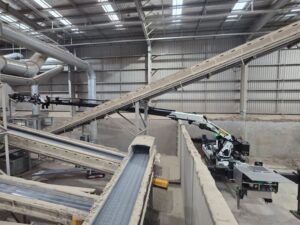
How Conveyor Systems Are Revolutionising Waste Management
The Australian waste management sector is under mounting pressure, with 75.6 million tonnes of waste generated in 2022-23. Conventional handling
Get your industrial or residential waste management and recycling needs fulfilled with the cutting-edge solutions available in OGTEC’s inventory. We have dedicated machinery that works for various materials, aligning with distinct needs. From basic shredders to high-end Artificial Intelligence embedded tools, we have everything required for a smooth recycling process.
Since 2015, we have been supplying innovatively designed and highly effective waste management tools to our clients. Our team of experts offers assistance in everything from designing & manufacturing to installing. Explore our products to streamline your waste management in Melbourne with the best equipment!
This process transforms discarded plastic items into reusable materials. Advanced techniques sort, shred, and reprocess plastics into new products, minimizing waste in landfills.
It includes repurposing fabrics and clothing by sorting and processing them into fibers or usable materials. This helps reduce landfill waste, conserve resources, and support a circular economy in the fashion and manufacturing industries.
Organics recycling converts food waste, yard trimmings, and other organic materials into compost or biogas. This process reduces methane emissions and promotes sustainable agriculture through nutrient-rich compost.
Co-mingled recycling simplifies waste collection by combining multiple recyclables—such as plastics, metals, and glass—into a single stream. This solution improves recycling rates and simplifies sorting at specialized recovery facilities.
Used tires are converted into materials like rubber, steel, and textile fibers. These reclaimed resources can be used for road surfacing, playgrounds, and more.
Skip bin recycling offers convenient waste collection for construction sites and businesses. Waste is sorted post-collection to ensure recyclable materials like metals, wood, and plastics are processed properly while minimizing landfill contributions.
Cardboard and paper recycling reprocesses these materials into new paper products. This reduces deforestation, conserves energy, and supports a sustainable cycle of paper production, making it a key component in waste management.
Our shredders break down materials into smaller pieces. Primary shredders are dedicated to handling large items, while secondary shredders refine the output to ensure efficient processing for further recycling or disposal.
Screens separate waste by size to properly sort recyclable materials. These machines efficiently filter out fine particles and direct larger materials to the next stage of processing.
When there’s a need for separating ferrous metals from waste, our magnets can be used. By pulling out iron and steel components, they streamline the recycling process and allow for cleaner, purer material recovery.
Eddy currents are designed to effectively separate non-ferrous metals such as aluminum and copper from waste.
Our Ballistic separators’ unique design effectively sorts waste by density, shape, and size, separating 2D materials like paper from 3D materials like bottles.
Bag openers handle waste in bags by tearing them open without shredding the contents. This allows for smoother sorting and processing, improving material separation and reducing downtime caused by bagged waste in recycling facilities.
They are designed to detect and sort materials by composition, such as plastics, paper, and glass.
They crush waste materials into smaller particles using high-speed hammers. These machines are perfect for breaking down tough items ensuring thorough size reduction before further processing.
Windshifters have the job of separating light materials from heavier waste using powerful air currents.
They use rotating discs to separate waste based on size and shape. Their efficient design allows for quick sorting of materials like paper and plastic for a sorted output for recycling.
Balers are used to compress recyclable materials into compact bales for easier storage, transport, and processing. By reducing the volume of waste, balers improve logistics efficiency and lower operational costs.
Wrappers seal compressed bales in protective film to keep recyclable materials intact and reduce contamination during storage and transport.
These systems streamline recycling operations by automating processes and ensuring consistent machine performance eliminating human error, and improving safety standards across waste management facilities.
Our machines are integrated with smart AI and robotic technology to automate complex tasks and bring precision to waste sorting. These advanced systems can identify and sort materials with incredible accuracy.

The Australian waste management sector is under mounting pressure, with 75.6 million tonnes of waste generated in 2022-23. Conventional handling
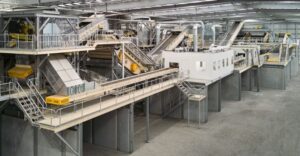
Plastic remains one of the most dangerous threats to our environment, with millions of tonnes of waste generated worldwide every

The construction and demolition (C&D) industry generates one of the largest waste streams worldwide, producing millions of tons of debris
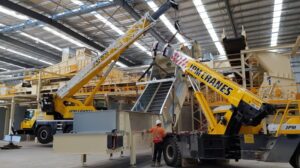
Did you know Australian businesses generate over 7.4 million tonnes of waste annually? Most of it, plastics, packaging, textiles, and
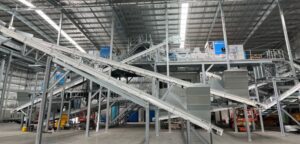
It has been reported that Australia generates over 76 million tonnes of waste annually, with more than 32 million tonnes
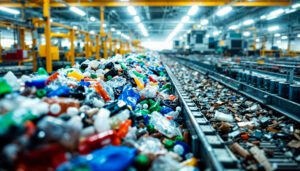
Did you know that industries produce almost 50% of the world’s total waste, which is almost over 2 billion tons?
Our plastic recycling solutions are designed to process a variety of plastics, including PET, HDPE, and LDPE, to transform the waste into reusable resources. Here, we integrate systems to sort, shred, wash, and granulate plastic materials enabling the creation of new products from the recycled plastic